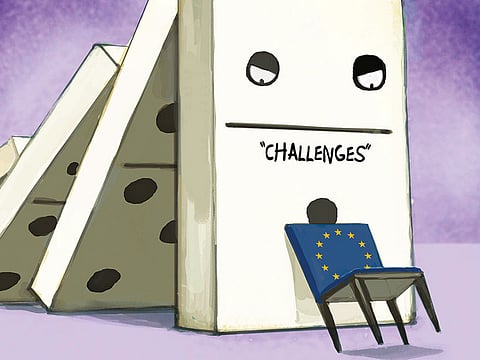Europe needs to cohese in a better way
EU is doing remarkable work as a political and economic union but the global body has to do more to overcome internal and external challenges

Commemorating 60 years of its existence, entering into negotiations with the United Kingdom over Brexit and invoking Article 7 of the Lisbon Treaty against Poland on grounds of protecting the rule of law, it is reasonable to say that last year has been a remarkable one for the European Union (EU).
Instead of growing apart, a handful of statesmen and civil servants exceptionally determined to put an end to international hatred and rivalry in Europe. In doing so the EU was able to construct an unparalleled initiative for a lasting peace between former enemies.
EU has been a success at multiple fronts. The (voluntary) ceding of real power by sovereign countries to some sort of commonly shared, managed and institutionalised union which could slash tariff and non-tariff barriers to trade, create a common market, prevent nationalism and operate upon supranational lines constituted the overall idea.
In a practical and symbolic manner, raw materials of war machinery (coal and steel) turned into instruments of reconciliation and peace. This bold and generous move proved to be successful. Pertinent to note that the geographical boundaries of the EU were not drawn by the six founding members of the 1950s but by all those who were not willing to join the Union.
Historically different nations in the EU had different priorities. The economic dependence and external trade interests (with France and West Germany) meant that the three founding customs union countries — Belgium, Luxembourg and the Netherlands — had no choice but to participate. On the other end, despite its own United States of Europe idea, the British government was initially not prepared to step in, leaving itself afar from European integration until 1973, before deciding to leave at some point in the future, following the Brexit referendum in 2016.
The new, post-Second World War government of Italy also wanted to rebuild its economy and restore its political links, and joined the five Western European countries interested in founding closer cooperation. Interestingly, Spain under Franco, Portugal under Salazar and Greece under the colonels were not acceptable as members. Countries in Central and Eastern Europe and the Western Balkans also had to wait until profound changes in regime and ideology took place before applying for membership based on democratic values, the rule of law and on free market economic principles.
The idea of a single economic entity with a single currency for much of its members was perceived to represent an expression with an immense economic weight, growing political leverage and a military capability.
In a changing world configuration where traditional strengths and leadership of several western powers is fast eroding, it is imperative, though, that the unifying ideas of the founding fathers of the European integration project will not be lost. Although populism and anti-EU sentiment have been gaining ground in some EU member-states, elections in France and Germany proved otherwise.
What is also true is the fact that the political arena in Europe has been taken over by a new generation of politicians for whom the Second World War and the momentum of the post-Second World War period, are not matters of direct personal recollection and a valuable point of reference.
The political assumptions and the historical context embodying the crucial underlying factors, which justified the process of European integration, will thus be less widely understood and less commonly shared in the years ahead.
In office for more than a year and centring his major policy around the premise of ‘America First’, United States President Donald Trump reached out to Europe in his own way. He met EU dignitaries Donald Tusk, President of the European Council, and Jean-Claude Juncker, President of the European Commission, addressed the European members of the North Atlantic Treaty Organisation (Nato) in Brussels on collective security before meeting the then French President-elect Emmanuel Macron in Paris, and attending the top-20 global economies’ G20 gathering in Hamburg.
Insecurity in the transatlantic relationship, and changes in the balance of power in global economic and financial management structures, have not gone without notice to the emerging global actors.
It is expected that geo-economic and geopolitical engineering will continue to reshape and rebalance regional and global governance institutions that have for long been exclusively dominated by post-Second World War western powers.
If the EU wishes to be an integral part of a multi-polar leadership and multilateral management of global political economy of tomorrow, then it is about time that the member-states acknowledge and act meaningfully.
The creation and appointment of a European Minister of Economy and Finance to back the Eurozone, and upholding the recent decision to back the common security and defence policy, such as a military hardware-standardised EU force, would be a good beginning for this year.
Johann Weick is an expert in international trade policy, European integration and specialist in GCC-EU relations.



